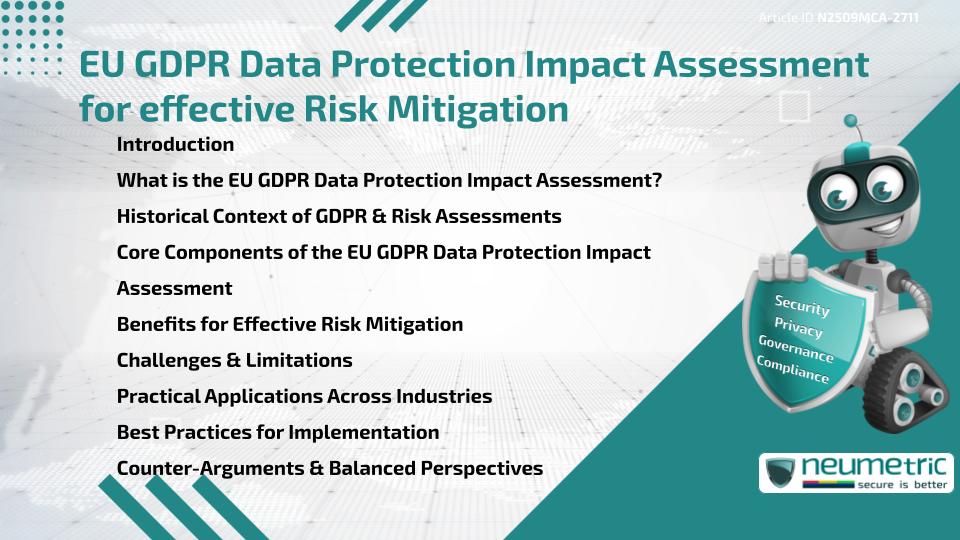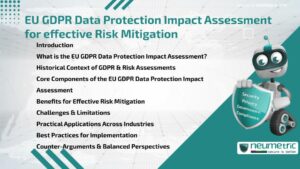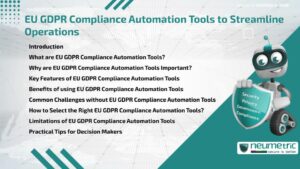Table of Contents
ToggleIntroduction
The EU GDPR Data Protection impact Assessment is a key requirement under the General Data Protection Regulation [GDPR] that helps Organisations identify & mitigate Risks associated with processing Personal Data. It ensures compliance with Data Protection laws, strengthens trust with Stakeholders & supports effective decision-making by highlighting potential Vulnerabilities before they cause harm.
What is the EU GDPR Data Protection Impact Assessment?
The EU GDPR Data Protection impact Assessment [DPIA] is a structured process required when data processing activities pose high Risks to individual rights & freedoms. It involves evaluating the necessity & proportionality of processing activities, identifying potential Risks & outlining measures to mitigate those Risks. A DPIA ensures that Organisations remain compliant while maintaining accountability in handling Sensitive Data.
Historical Context of GDPR & Risk Assessments
The GDPR, introduced in 2018, significantly changed the way Organisations approach Data Protection. Prior to GDPR, many businesses conducted informal assessments. The Regulation formalized the concept of the DPIA, requiring documented evaluations whenever high-Risk data processing occurs. This shift reflected growing global awareness of Privacy Risks & the need for stronger safeguards in the digital era.
Core Components of the EU GDPR Data Protection Impact Assessment
- Description of Processing: Detailing what Personal Data is collected & how it is used.
- Assessment of Necessity & Proportionality: Evaluating whether processing is justified.
- Risk Identification: Highlighting Potential Threats to data subjects’ rights.
- Mitigation Measures: Outlining safeguards, technical controls & Policies.
- Documentation & Reporting: Recording the process & results for accountability.
Benefits for Effective Risk Mitigation
Conducting an EU GDPR Data Protection impact Assessment helps Organisations:
- Proactively identify Vulnerabilities in data handling practices.
- Strengthen compliance with GDPR & related Data Protection laws.
- Increase transparency with regulators, clients & Stakeholders.
- Reduce reputational Risks linked to data breaches or non-compliance.
- Streamline operational efficiency by embedding Privacy into workflows.
Challenges & Limitations
Despite its benefits, carrying out a DPIA may pose challenges. Smaller Organisations may lack expertise in interpreting regulatory requirements. The process can be time-consuming, especially in complex data environments. Additionally, businesses may view the DPIA as a compliance checkbox rather than a meaningful exercise in Risk Management.
Practical Applications Across Industries
- Healthcare: Assessing Risks in handling Patient Records & medical histories.
- Finance: Evaluating Risks in processing Customer Financial data.
- Retail: Reviewing Risks in collecting & storing Customer purchase data.
- Technology: Addressing Risks in large-scale data analytics & AI Systems.
- Education: Protecting student information in digital learning environments.
Best Practices for Implementation
- Involve Stakeholders from legal, technical & operational teams.
- Use standardised templates to ensure consistency.
- Integrate the DPIA into project planning phases.
- Review & update assessments regularly.
- Seek guidance from Data Protection authorities when needed.
Counter-Arguments & Balanced Perspectives
Some critics argue that the EU GDPR Data Protection impact Assessment is overly bureaucratic, slowing down innovation. Others point out that Organisations may treat it as a formality rather than a genuine Risk Management exercise. However, supporters highlight that when applied effectively, a DPIA is not just about compliance but also about fostering a culture of accountability & Privacy protection.
Takeaways
- A DPIA is a legal requirement under GDPR for high-Risk processing.
- Helps Organisations identify & mitigate Data Protection Risks.
- Strengthens trust with Stakeholders through transparency.
- Enhances operational efficiency by embedding Privacy into workflows.
- Must be seen as more than a compliance checkbox to deliver value.
FAQ
What is an EU GDPR Data Protection impact Assessment?
It is a process to identify & mitigate Risks associated with high-Risk Personal Data processing activities.
When is a DPIA required?
A DPIA is required when processing activities pose high Risks to individual rights, such as large-scale monitoring or use of Sensitive Data.
Who is responsible for conducting a DPIA?
The organisation’s data controller is responsible, often with input from Data Protection officers & other Stakeholders.
What are common challenges in conducting a DPIA?
Challenges include lack of expertise, time constraints & viewing the process as a compliance formality.
Does a DPIA guarantee compliance?
It supports compliance but should be combined with strong security practices & Governance Policies.
How does a DPIA benefit Organisations?
It reduces legal Risks, prevents data breaches & builds Stakeholder trust.
Need help for Security, Privacy, Governance & VAPT?
Neumetric provides organisations the necessary help to achieve their Cybersecurity, Compliance, Governance, Privacy, Certifications & Pentesting needs.
Organisations & Businesses, specifically those which provide SaaS & AI Solutions in the Fintech, BFSI & other regulated sectors, usually need a Cybersecurity Partner for meeting & maintaining the ongoing Security & Privacy needs & requirements of their Enterprise Clients & Privacy conscious Customers.
SOC 2, ISO 27001, ISO 42001, NIST, HIPAA, HECVAT, EU GDPR are some of the Frameworks that are served by Fusion – a SaaS, multimodular, multitenant, centralised, automated, Cybersecurity & Compliance Management system.
Neumetric also provides Expert Services for technical security which covers VAPT for Web Applications, APIs, iOS & Android Mobile Apps, Security Testing for AWS & other Cloud Environments & Cloud Infrastructure & other similar scopes.
Reach out to us by Email or filling out the Contact Form…





